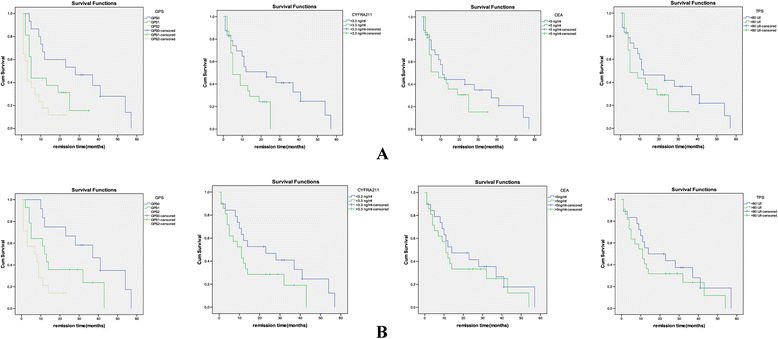The relationship between Glasgow Prognostic Score and serum tumor markers in patients with advanced non-small cell lung cancer
- PMID: 25956656
- PMCID: PMC4432878
- DOI: 10.1186/s12885-015-1403-x
The relationship between Glasgow Prognostic Score and serum tumor markers in patients with advanced non-small cell lung cancer
Abstract
Background: Glasgow Prognostic Score (GPS) has been reported as a powerful prognostic tool for patients with advanced non-small cell lung cancer (NSCLC). The aim of this study was to assess the relationship between GPS and prognosis related tumor markers in patients with advanced NSCLC.
Methods: We included 138 advanced NSCLC patients and twenty healthy controls in the study. GPS was calculated by combined serum C-reactive protein (CRP) and albumin. Three serum tumor markers, which included cytokeratin 19 fragment antigen 21-1 (CYFRA21-1), carcinoembryonic antigen (CEA) and tissue polypeptide specific antigen (TPS), were detected by enzyme-linked immunosorbent assay (ELISA). GPS and tumor markers were all assessed before chemotherapy. All patients received at least 2 courses of cisplatin-based chemotherapy. After that, 2 to 5 years follow-up was conducted.
Results: Median levels of CYFRA21-1 were 1.5 ng/ml (0.1-3.1 ng/ml) in healthy controls, and 4.6 ng/ml (0.7-35.2 ng/ml) in GPS 0 advanced NSCLC, 11.2 ng/ml (0.4-89.2) ng/ml in GPS 1 advanced NSCLC, and 15.7 ng/ml (2.9-134.6 ng/ml) in GPS 2 advanced NSCLC, respectively. Median levels of CYFRA21-1 were higher in NSCLC patients than in healthy controls, and CYFRA21-1 increased gradually according to GPS category in NSCLC patients (P< 0.05). Similar results were found for median levels of CEA and TPS in healthy controls and NSCLC patients (P < 0.05). In NSCLC patients, positive correlations were found between CYFRA21-1 and GPS, CEA and GPS, TPS and GPS. The Spearman's rank correlation coefficient were 0.67 (P < 0.05), 0.61 (P < 0.05) and 0.55 (P < 0.05), respectively. Survival analyses showed GPS was an independent prognostic factor for advanced NSCLC. CYFRA21-1(>3.3 ng/ml) and TPS (>80 U/l) were related with the prognosis of advanced NSCLC by univariate analyses, but multivariate analyses showed CYFRA21-1, TPS and CEA were not the independent prognostic factors for advanced NSCLC.
Conclusions: Our results showed GPS were positive correlated with CYFRA21-1, CEA and TPS in patients with advanced NSCLC. However, GPS was more efficient in predicting prognosis of advanced NSCLC than these three single prognosis related tumor markers.
Figures


Similar articles
-
The Diagnostic and Prognostic Value of the Combination of Tumor M2-Pyruvate Kinase, Carcinoembryonic Antigen, and Cytokeratin 19 Fragment in Non-Small Cell Lung Cancer.Technol Cancer Res Treat. 2024 Jan-Dec;23:15330338241265983. doi: 10.1177/15330338241265983. Technol Cancer Res Treat. 2024. PMID: 39043046 Free PMC article.
-
[Variations in Serum CEA and CYFRA21-1 Levels Before and After Surgery Facilitate Prognosis of Non-small Cell Lung Cancer Patients].Zhongguo Fei Ai Za Zhi. 2015 Jun;18(6):358-64. doi: 10.3779/j.issn.1009-3419.2015.06.05. Zhongguo Fei Ai Za Zhi. 2015. PMID: 26104892 Free PMC article. Chinese.
-
Prognostic value of carcinoembryonic antigen and CYFRA21-1 in patients with pathological stage I non-small cell lung cancer.Eur J Cardiothorac Surg. 2007 Sep;32(3):435-9. doi: 10.1016/j.ejcts.2007.05.014. Epub 2007 Jul 3. Eur J Cardiothorac Surg. 2007. PMID: 17611117
-
Carcinoembryonic antigen (CEA) as tumor marker in lung cancer.Lung Cancer. 2012 May;76(2):138-43. doi: 10.1016/j.lungcan.2011.11.012. Epub 2011 Dec 6. Lung Cancer. 2012. PMID: 22153832 Review.
-
Elevated preoperative CEA is associated with subclinical nodal involvement and worse survival in stage I non-small cell lung cancer: a systematic review and meta-analysis.J Cardiothorac Surg. 2020 Oct 15;15(1):318. doi: 10.1186/s13019-020-01353-2. J Cardiothorac Surg. 2020. PMID: 33059696 Free PMC article.
Cited by
-
The predictive value of pretreatment haemoglobin-to-red cell distribution width ratio for overall survival of patients with advanced non-small cell lung cancer: a propensity score matching analysis.J Int Med Res. 2021 Apr;49(4):3000605211004229. doi: 10.1177/03000605211004229. J Int Med Res. 2021. PMID: 33823630 Free PMC article.
-
Prognostic Value of Post First-Line Chemotherapy Glasgow Prognostic Score in Advanced Non-Small Cell Lung Cancer.Clin Med Insights Oncol. 2022 Mar 22;16:11795549221086578. doi: 10.1177/11795549221086578. eCollection 2022. Clin Med Insights Oncol. 2022. PMID: 35342321 Free PMC article.
-
Prediction of Postoperative Clinical Outcomes in Resected Stage I Non-Small Cell Lung Cancer Focusing on the Preoperative Glasgow Prognostic Score.Cancers (Basel). 2020 Jan 8;12(1):152. doi: 10.3390/cancers12010152. Cancers (Basel). 2020. PMID: 31936329 Free PMC article.
-
The impact of immune-inflammation-nutritional parameters on the prognosis of non-small cell lung cancer patients treated with atezolizumab.J Thorac Dis. 2020 Apr;12(4):1520-1528. doi: 10.21037/jtd.2020.02.27. J Thorac Dis. 2020. PMID: 32395289 Free PMC article.
-
Pretreatment Lymphocyte to Monocyte Ratio as a Prognostic Marker for Advanced Pulmonary Squamous Cell Carcinoma Treated With Chemotherapy.J Clin Med Res. 2018 Aug;10(8):657-664. doi: 10.14740/jocmr3490w. Epub 2018 Jun 27. J Clin Med Res. 2018. PMID: 29977424 Free PMC article.
References
-
- Mimatsu K, Oida T, Fukino N, Kano H, Kawasaki A, Kida K, et al. Glasgow prognostic score is a useful predictive factor of outcome after palliative gastrectomy for stage IV gastric cancer. Anticancer Res. 2014;34(6):3131–6. - PubMed
MeSH terms
Substances
LinkOut - more resources
Full Text Sources
Other Literature Sources
Medical
Research Materials
Miscellaneous

